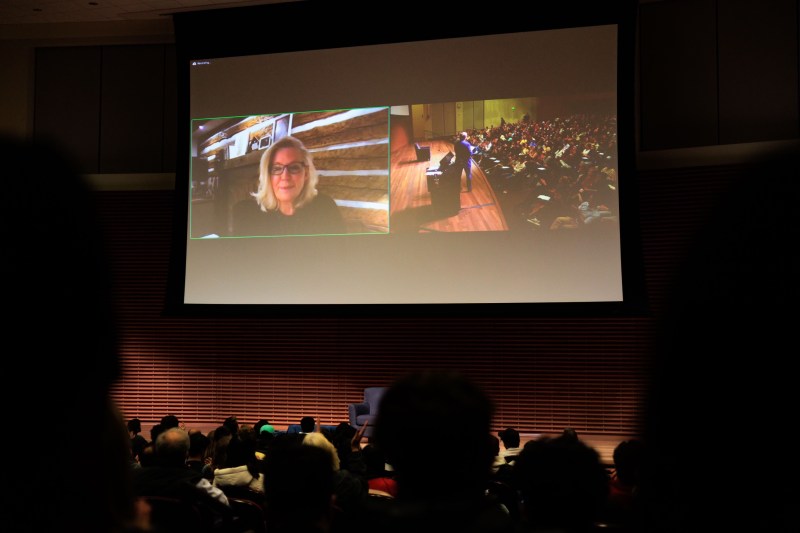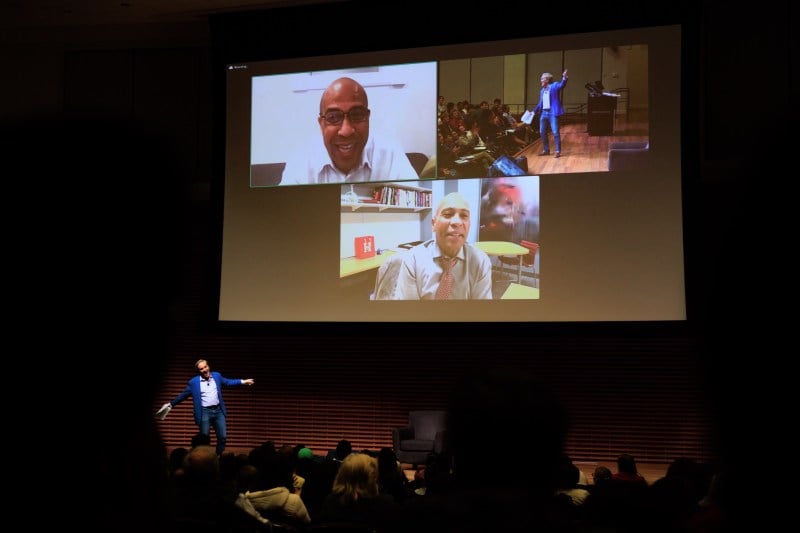Decades ago, Sen. Cory Booker (D-NJ) ’91 M.S. ’92 was a student at Stanford who moseyed to classes between attending football practice and spending time with friends. He made a virtual return to campus Monday evening, this time not as a student but as a teacher for POL 61: “Politics 2022: America at a Crossroads.” Booker encouraged students to engage with American politics and stressed the importance of compassion to being a great leader.
He was joined by former governor of Massachusetts Deval Patrick. The two exchanged remarks on everything from the importance of not losing sight of the American Dream to being members of the “bald Black men club.”
Booker followed a talk with Rep. Liz Cheney (R-WY) held during the first half of class, where she spoke about the importance of accountability following the Jan. 6 riots.
Cheney serves as one of two Republican representatives for the Jan. 6 committee, which decided today to make criminal referrals to the Department of Justice.
Jan. 6 and holding others accountable
Cheney told the class there was no doubt in her mind that she felt it was necessary to impeach former president Donald Trump when she had to evacuate the Capitol on Jan. 6. Thousands of people flooded the Capitol Building that day, hoping to overturn the results of the 2020 presidential election. The event came after weeks of Trump falsely stating that the 2020 election was rigged.
“I think one of the most important ways to ensure we don’t have another Jan. 6, is to hold accountable the people who did last Jan. 6, and that accountability cannot stop at just the people who invaded the Capitol,” Cheney said. “It must reach up to the highest level. Nobody is above the law.”
Others in her political party have not been as assertive in prosecuting those responsible for Jan. 6, an approach that Cheney strongly disagrees with.
“Most elected Republicans decided that staying in office and getting reelected and keeping our heads down was more important than anything else,” Cheney said.
Cheney said there are repercussions to Jan. 6 and the response, or lack thereof from her Republican colleagues, on an international scale. Abroad, she said some people are questioning America’s ability to be a leader of democracy following Jan. 6.
“It’s certainly caused a lot of people to really wonder about a country that has been such a leader in the world,” Cheney said.
To restore American democracy and decrease political polarization, Cheney said she calls on lessons she has learned not only from being a representative, but also from her family. It was fundamental to “follow the lessons that your parents taught you when you were little,” Cheney said.
“We ought to respect each other enough to say, ‘I shouldn’t have been that partisan. And I’m not going to attack you based on personal attacks. I’m going to be focused on substance and policy,” Cheney said.

‘Real leaders lead with love’
Booker echoed Cheney on the importance of respect. One of Booker’s greatest mentors, an elderly woman he met in his early days as a politician, once told him that he had the arrogance of a Yale law student.
“I would show up on her doorstep and say, ‘Hi ma’am. I’m Cory Booker. I’m here to help.’ And she looks at me like ‘Dude, you’re the one that needs some help,’” Booker said.
Booker said she then had him walk around her neighborhood and asked what he saw. Booker told the woman he saw drug dealing, abandoned buildings and violence.
Disappointed, the woman walked away. But Booker wanted to understand what he did wrong.
“And this elderly woman says to me, ‘boy, you need to understand the world you see outside of you is a reflection of what you have inside. And if you’re one of these people who only comes to my neighborhood and sees darkness and despair, then that’s all there’s ever going to be,’” Booker said.
Booker said she encouraged him to open his eyes and see hope, possibility and love, if he wanted to be someone that could help.
Ever since that moment, Booker said he sought to center compassion in all of his political activities – something he sees as lacking in American politics.
“I’m struggling today because I lost a 39-year-old friend this morning… and the last time I saw him alive he had a sweatshirt that I gave him that said a simple line: ‘real leaders lead with love,” Booker said. “I really believe that you can’t lead the people if you don’t love the people.”
Both Patrick and Booker agreed love was essential to building a greater sense of community among American people.
The common thread? Kindness and respect.
“The greatest thing you can do in your life is small acts of kindness,” Booker said. “Change happens because every day individuals do small acts of kindness.”
Patrick expressed similar sentiments throughout the evening, emphasizing a lost sense of community among Americans today.
“When I was living my own American dream, it wasn’t just grit… it was food programs and housing. I had great teachers who were prepared and loved us… All of these things were part of my and everyone else’s stories,” Patrick said. “We are missing the sense of common cause and belonging.”
“We’re seeping into a culture of contempt in this country,” Booker said. “I think that’s aggravating a deeper problem we have – a severed sense of belonging… We are a nation right now that is having a spiritual crisis.”
Booker’s final piece of advice for the class was to remember that they were not helpless.
Power comes from the choices people make in their everyday lives, whether it’s big or small, Booker said.
A previous version of this article incorrectly stated that Rep. Liz Cheney is a senator and incorrectly stated that Cheney evacuated the White House on Jan. 6. The Daily regrets these errors.
